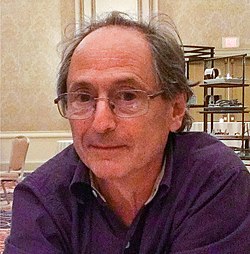Michael Levitt
biofisico sudafricano naturalizzato statunitense
Michael Levitt (Pretoria, 9 maggio 1947) è un fisico sudafricano naturalizzato statunitense, vincitore del premio Nobel per la chimica nel 2013, assieme a Martin Karplus e Arieh Warshel, per gli studi sullo sviluppo di modelli multiscala in grado di descrivere reazioni chimiche complesse[1][2][3].

 Premio Nobel per la chimica 2013
Premio Nobel per la chimica 2013Levitt è stato uno dei primi ricercatori a condurre simulazioni di dinamica molecolare di DNA e proteine e a sviluppare il primo software per questo scopo.[4][5][6][7]
Onorificenze
Note
- ^ (EN) The Nobel Prize in Chemistry 2013, su nobelprize.org, Royal Swedish Academy of Sciences, 9 ottobre 2013. URL consultato il 9 ottobre 2013.
- ^ Redazione Online, Il Nobel per la Chimica a Karplus, Levitt e Warshel, in Corriere della Sera, 9 ottobre 2013. URL consultato il 9 ottobre 2013.
- ^ Premio Nobel per la chimica a Karplus, Levitt e Warshel, in La Repubblica, 9 ottobre 2013. URL consultato il 9 ottobre 2013.
- ^ (EN) Cyrus Chothia, Arthur M. Lesk, Anna Tramontano, Michael Levitt, Sandra J. Smith-Gill, Gillian Air, Conformations of immunoglobulin hypervariable regions, in Nature, vol. 342, n. 6252, 1989, pp. 877–883, DOI:10.1038/342877a0.
- ^ (EN) Michael Levitt, Cyrus Chothia, Structural patterns in globular proteins, in Nature, vol. 261, n. 5561, 1976, pp. 552–558, DOI:10.1038/261552a0.
- ^ (EN) A. Warshel, M. Levitt, Theoretical studies of enzymic reactions: Dielectric, electrostatic and steric stabilization of the carbonium ion in the reaction of lysozyme, in Journal of Molecular Biology, vol. 103, n. 2, 1976, pp. 227–249, DOI:10.1016/0022-2836(76)90311-9.
- ^ (EN) Michael Levitt, A simplified representation of protein conformations for rapid simulation of protein folding, in Journal of Molecular Biology, vol. 104, n. 1, 1976, pp. 59–107, DOI:10.1016/0022-2836(76)90004-8.